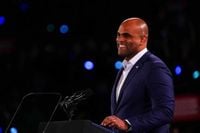As the political season heats up in the United States, two prominent Democrats—Kamala Harris and Colin Allred—are stepping back into the spotlight, each carrying the weight of recent defeats and the hopes of a party searching for direction after a bruising 2024. Their comebacks, though different in style and substance, are stirring debate among party insiders and voters alike, raising questions about the future of Democratic leadership and the path forward after a year many would rather forget.
On September 23, 2025, Kamala Harris will release her much-anticipated memoir, 107 Days, kicking off a 15-city book tour that promises both reflection and controversy. According to Daily Mail, the tour is set to revisit the tumultuous days following President Joe Biden’s exit from the 2024 presidential race—a period that saw Harris thrust into the center of a campaign that ultimately collapsed against Donald Trump. The Democratic Party, still staggering under more than $20 million in campaign debt left by Harris’s failed bid, is watching her return with a mix of hope, skepticism, and, in some quarters, outright frustration.
Early excerpts from Harris’s memoir paint her as a tragic heroine, grappling with the aftermath of defeat and the choices that shaped her short-lived campaign. She reflects candidly on her decisions, admitting to hesitations that some in the party see as emblematic of the broader Democratic collapse. One of the most explosive revelations is Harris’s admission that she avoided selecting Pete Buttigieg as her running mate because he was gay—a decision that has reignited debates about representation and strategy within Democratic ranks. "The truth is that, like Joe Biden before her, she prioritized making sure that her running mate would not overshadow her, and she got what she wanted," wrote journalist Josh Barro on X, capturing the sentiment of many disillusioned party members.
The timing of Harris’s reemergence is awkward for a party still licking its wounds. Some activists hope her book tour will serve as a kind of group therapy for Democrats, a chance to grieve and process the loss before moving on. "Stare into the abyss and sit in the way you feel right now and see what comes of it," one Democratic strategist told Daily Mail, urging the party to confront its pain head-on. Others, however, fear that Harris’s tour will only reopen old wounds, keeping Democrats stuck in the past while new leaders like California Governor Gavin Newsom and Illinois Governor JB Pritzker step up as potential 2028 contenders.
Even those close to Harris express doubts about the tour’s impact on her future prospects. "It doesn’t mean anything when it comes to 2028, because that’s going to be a huge wide open field," said one former aide, suggesting that the party’s next presidential primary will be fiercely contested. The failure to hold a primary in 2024, some strategists argue, was a key factor in the party’s fragmentation and ultimate defeat—a mistake they are determined not to repeat.
Financially, the Democratic National Committee remains hamstrung by the aftermath of Harris’s campaign, with just $15 million in cash on hand after covering her debts. This fiscal hangover is one more reason many in the party are wary of Harris trying to reclaim the mantle of leadership. As Democratic strategist Joe Trippi put it, "She is on a book tour, which is about selling books. I don’t think it impacts the party one way or another." Yet, the tour’s real significance may lie in the signals it sends about Harris’s political ambitions. If she uses the platform to rally anti-Trump sentiment, observers say, it could be a sign that she is eyeing another run in 2028.
Meanwhile, in Texas, Colin Allred is mounting his own comeback, seeking redemption after an 8.5-point loss to Republican Ted Cruz in the 2024 U.S. Senate race. After seven months away from the political fray—time spent as a stay-at-home dad and reflecting on his journey—Allred announced his return to politics in July 2025. In an interview with the Houston Chronicle on September 18, Allred spoke candidly about the lessons learned from defeat and his determination to connect with working-class and swing voters who, he believes, are now experiencing "buyer’s remorse."
"There’s a frustration there," Allred said, describing the mood among Texans who feel let down by Republican promises. "Folks were promised that their costs were going to go down, they were promised that inflation was going to go away, they were promised that jobs were going to come back. We’ve gotten the opposite on everything. Inflation is up, cost of living is up, unemployment is up. There were a lot of promises made to them, and they were lied to."
Allred’s new campaign for the 2026 U.S. Senate Democratic primary is markedly different from his previous run. No longer the golden child of Texas Democrats, he faces stiff competition from state Rep. James Talarico, a 36-year-old rising star who has captured the early spotlight with his social media savvy and energetic campaign. Critics say Allred had his shot and is yesterday’s news, but he is betting that his experience—and his willingness to show vulnerability—will resonate with voters looking for authenticity.
Drawing on his upbringing in a single-parent household and his background as a former NFL linebacker, Allred is leaning into empathy and personal storytelling. "I’ve had to get more comfortable with telling the stories about what it was like to grow up (in a single-parent household where pennies had to be pinched), because in our family, we generally don’t talk about stuff like that," he shared. He recounted how he and his mother lived in the same rent house for 20 years, finally purchasing it with money he earned from playing pro football. "You shouldn’t have to have a son in the NFL to be able to buy a house," Allred said, highlighting the economic challenges facing many Texans.
For Allred, the stakes of the 2026 race go beyond personal redemption. He believes that if a Democrat can win a statewide race in Texas—a feat not accomplished since 1998—it would have seismic implications for national politics. "I think it would fundamentally reshape probably a lot of things nationally," Allred asserted. "But I think we would see an immediate change in every aspect of our politics here at home."
As Harris and Allred each embark on their respective comebacks, the Democratic Party finds itself at a crossroads. Will it look backward, relitigating the failures of 2024, or turn the page and embrace new voices and ideas? For now, the answer remains uncertain. What is clear, however, is that the road ahead will be shaped by the willingness of its leaders—and its voters—to confront hard truths, heal old divisions, and chart a path toward renewal.




